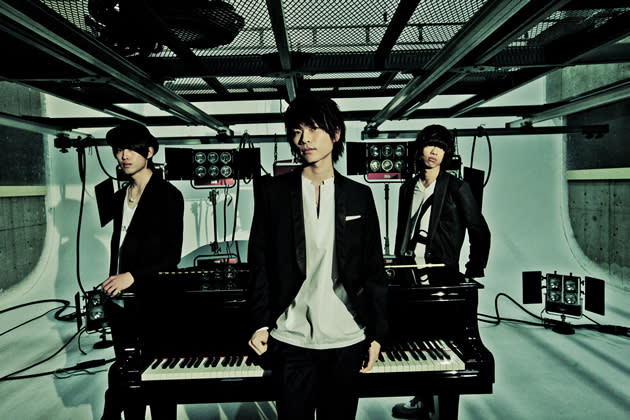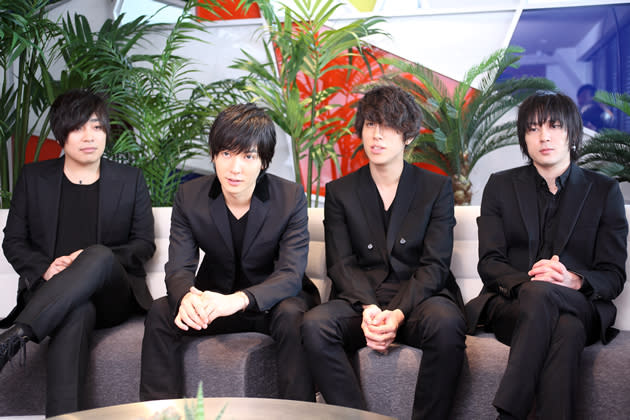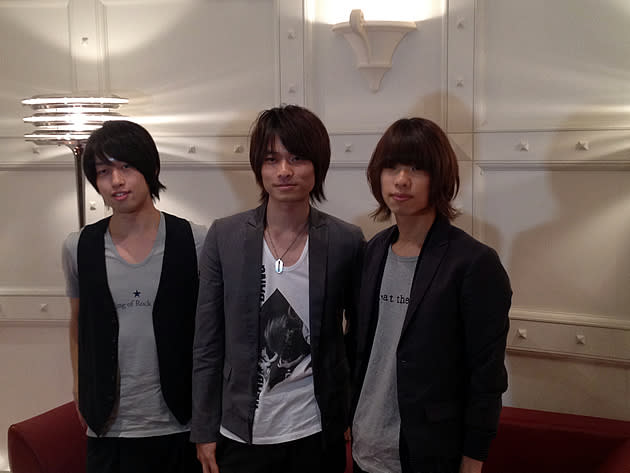Is Singapore ready for the ‘new J-pop’?

In a move J-pop fans have spent a good part of the past decade waiting for, an entertainment company intends to bring Japanese music back to Singapore in a big way.
Starting with a small showcase this month of two of its up-and-coming young pop-rock bands, flumpool and WEAVER, Japanese entertainment group Amuse Inc. aims to restore J-pop to the widespread popularity it enjoyed in its heyday during the '80s and '90s.
Speaking to Yahoo! Singapore in Tokyo recently, the company's director Noboyuki Soma says it won't be a revival of the language genre, but instead an introduction of what he calls "the new J-pop".
"This is not a revival -- this will be the first time they (flumpool and WEAVER) are going to be in Singapore," he said in Japanese. "We are going to learn how to bring up the new J-pop in Singapore, and also in Asian countries."
Three-man piano-rock band WEAVER will be opening for flumpool, a four-piece pop-rock band that will perform in a 30-minute showcase at *SCAPE on 15 September. WEAVER has performed in Singapore earlier this year, while the upcoming show will be flumpool's debut gig here.
The purpose of their small-scale concert, according to Soma-san, is to "test the water", and through this he hopes to observe how Singaporean audiences react to the two bands, and learn how to best bring J-pop artistes -- and its culture -- back into Singapore.
flumpool's and WEAVER's performances in Singapore will be followed later this year by one of Amuse's bigger female acts, Perfume, an electropop group that has been highly successful in Japan and regionally in recent years as well.
An uphill task?
The past decade has not been the best for the Japanese music scene in Singapore but things were vastly different back in the 1980s and 90s.
Then, Japanese dramas like Oshin, Tokyo Love Story, Beach Boys, Under the Same Roof and GTO: Great Teacher Onizuka, broke records on local ratings and viewership charts here, with local free-to-air channels screening over 10 Japanese drama series every year between 1995 and 2000. It made household names of singer/actors like SMAP's Takuya Kimura and "beach boy" Takashi Sorimachi.
The popularity of the TV dramas' theme songs and soundtracks in turn contributed to the rise of Japanese pop music here, with singers like Ayumi Hamasaki and Namie Amuro and groups like SMAP, X-Japan, Speed and Arashi racking up significant fan followings.
In more recent years, however, the J-pop craze has been replaced by the tidal wave of the Hallyu or Korean pop invasion through music, TV dramas and even food and culture.
When asked if they were intimidated by the mammoth scale of the K-pop culture present in Singapore, both bands told Yahoo! Singapore they weren't at all -- in fact, they said they enjoyed listening to K-pop music as well.
"We like K-pop, we listen to it -- they're very good with their performances, singing and dancing," said flumpool's lead vocalist Ryuta Yamamura. "But we're a band, we play with our hands, we play instruments and sing with our voices."
Similarly, WEAVER's pianist and lead singer Yuji Sugimoto maintained that their band is made of very serious musicians -- with himself composing music, drummer Touru Kawabe penning lyrics to them, as well as bassist Shouta Okuno, who keeps them all together and who mediates creative disagreements.
And therein may lie a clue to one of the major differences between J-pop and K-pop.
"We never felt that K-pop was something to beat, battle or accommodate specifically," said Sugimoto.
"All we see is just the different genre of music -- we love Big Bang and Monster -- we just see them as a different animal... we don't feel like they're lesser because they don't play instruments, it's just a different type of music."
Soma-san, who will be managing Amuse's newly-opened office in Singapore, acknowledges the uphill task bringing his artistes here would present, in particular with the prevalence and popularity of Korean dramas and Korean pop music here.
"I think it will be very challenging, but I don't want to compete with K-pop, because K-pop and J-pop are very different," he said.
"Singapore is the first step (outside of Japan and into Southeast Asia) for our young artistes, so the important thing is to respect Singapore and Singaporeans, and to communicate with them.
"I don't mean to compete with or remove K-pop, that's not what I mean; I just want to bring the good points of Japanese pop music into Singapore," he added.
Reaction to these plans among Singaporean J-pop fans seems slightly mixed, however, with some seeing it as a good sign but others hoping to see their older favourites back in Singapore instead.
Copywriter Alicia Tan, who is a fan of the two inbound bands, has already purchased tickets to the showcase, and welcomes the move.
"I'm really looking forward to seeing more Japanese acts here," said the 24-year-old, who however shared her concern that fans may not show their support, due to the lack of publicity and outreach at the moment.
"More needs to be done, not only to J-music fans but also the general public in order to sustain interest and actually get people purchasing tickets," she added.
Tan also noted that there are a lot of armchair J-pop music supporters who may listen to and know these new bands but may not move to attend their concerts, even if they were held here, suggesting that grouping different acts together in concerts may better contribute to their success.
"It might appeal to the Singaporean mentality of getting more for the same price, and at the same time, you get to expose the crowd to different bands that they otherwise might not have gone for," she said.
Longtime J-pop fan Alexandra Teo said the new bands might have trouble breaking into the Singapore market, though, adding that it might be a better idea to stage a revival with older bands she referred to as "heavyweights", such as Abingdon Boys School and Buck Tick.
Citing the success of L'Arc-en-Ciel's comeback concert this year, the 27-year-old banker voiced her belief that fans here would be better able to relate to older acts, should they stage a revival here.
"I feel that they (would) have more influence, especially if you want to penetrate a K-pop saturated market here," she said. "J-dramas were hot last time, but not so much now, and it would be quite hard (for newer, lesser-known bands) to break into the market."
Despite the odds seemingly stacked against Amuse's plans, though, Soma-san remains optimistic in the success of "the new J-pop" here, projecting a three-year timeline for it to achieve the popularity Japanese entertainment once enjoyed here.
He hopes that apart from giving his young bands a chance to grow, breaking into Singapore will help to establish a renewed relationship between the two countries.
"After the artistes have had a good experience in Singapore, they will come back and share many good things about it to the media here (in Japan), so a lot of young Japanese people will want to visit Singapore too -- so that means a new relationship between the young people in Japan and Singapore; we can start one," he said.
Given Amuse's vast stable of award-winning actors and actresses, specialist performers and even junior talent pool, Soma-san also voiced his hope of being able to in time bring more of his talent to Singapore, beyond musicians.
"I hope besides music that (other forms of) Japanese entertainment such as film can be popular and known by Singaporeans, and I hope that we can entertain Singaporeans more through Japanese entertainment."




